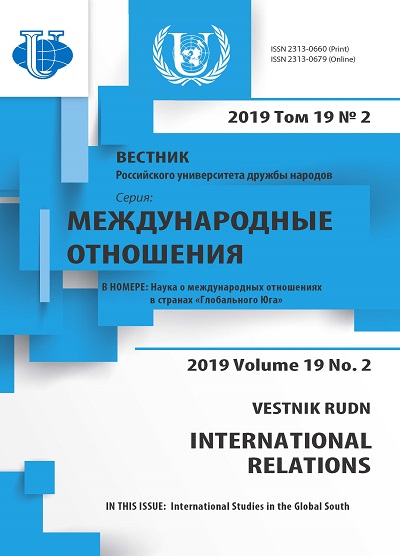Algerian-Russian Cooperation: True Strategic Partnership?
- Authors: Mousli M.1
-
Affiliations:
- Mission of the League of Arab States
- Issue: Vol 19, No 2 (2019): International Studies in the Global South
- Pages: 284-292
- Section: BILATERIAL RELATIONS
- URL: https://journals.rudn.ru/international-relations/article/view/21466
- DOI: https://doi.org/10.22363/2313-0660-2019-19-2-284-292
- ID: 21466
Cite item
Full Text
Abstract
Formally, the Algerian-Russian partnership is labeled “strategic”. This research is providing the answer whether this relationship could be qualified as a “strategic partnership”. Firstly, through the “strategic partnership” concept analysis as a mechanism of modern international cooperation, and secondly, applying the defined elements of “strategic partnership” to the Algerian-Russian relations. The interstate strategic partnership is generally based on the following elements: long and distinguished historical relations, material factors such as strong economic and political relations in the long term, and non-material factors such as common values. By process-tracing some selected economic and political fields and issues of the Algerian-Russian relationship, this article reveals the significance of 2001 as a crucial point that has urged both Algiers and Moscow to significantly alter both their outlook on global politics and on each other. Moreover, distinguished historical lasting and steady ties are at the heart of Algeria's strategic partnership with Russia. The Algerian-Russian / Soviet relations have always been distinct and exemplary both during the War of Independence and during the Cold War or after. Algeria and Russia link a number of common values. These include commitment to democracy, pluralism, the rule of law, and respect for international law. Both countries also respect the sovereignty and territorial integrity of the partner states, promoting a more equitable and balanced system of international relations based on collective solution of global problems, the primacy of international law, and equal relations with the central coordinating role of the UN as the main organization governing international relations. This leads to the conclusion that cooperation between Algeria and Russia is both real and formally a “strategic partnership”.
About the authors
Malek Mousli
Mission of the League of Arab States
Author for correspondence.
Email: mousli_malek@hotmail.com
PhD (International Relations), diplomat at the Moscow Mission of the League of Arab States
Moscow, Russian FederationReferences
- Algeria - Russia: Military Package. (2006). Africa Research Bulletin: Political, Social and Cultural Series, 43 (3), 16591-16592. doi: 10.1111/j.1467-825x.2006.00309.x.
- Antonyuk, V.S., Monogarov, N.N. & Lapo, A.S. (2017). Strategic Cooperation of the Russian Federation and the People’s Democratic Republic of Algeria in the Sphere of Energy Economics (by the Example of the Oil and Gas Sector). Bulletin of South Ural State University. Series “Economics and Management”, 11 (4), 7-12. doi: 10.14529/em170401.
- Bogucharsky, E.M. & Bogucharsky, M.E. (2003). Algeria’s Foreign Policy at the Turn of the Century. Asia and Africa Today, 4, 21-27. (In Russian).
- Bogucharsky, E.M. (2007). Diplomacy and Diplomatic Service of Algeria (1962-2006). Moscow: MGIMO University publ. (In Russian).
- Byrne, J. (2016). Mecca of Revolution: Algeria, Decolonization, and the Third World Order. Oxford University Press.
- Connolly, R. & Sendstad, C. (2017). Russia’s Role as an Arms Exporter: The Strategic and Economic Importance of Arms Exports for Russia. London: The Royal Institute of International Affairs.
- Ghettas, M.L. (2017). Algeria and the Cold War: International Relations and the Struggle for Autonomy. London: I.B. Tauris.
- Heiduk, F. (2014). What Is in a Name? Germany’s Strategic Partnerships with Asia’s Rising Powers. Asia, Europe Journal, Springer-Verlag Berlin Heidelberg. DOI: https://doi.org/10.1007/s10308-014-0399-1.
- Katz, N.K. (2007). Russia and Algeria: Partners or Competitors? Middle East Policy Council, 4 (4). URL: https://www.mepc.org/ journal/russia-and-algeria-partners-or-competitors (accessed: 01.01.2019).
- Kay, S. (2000). What Is a Strategic Partnership? Problems of Post-Communism, 47 (3), 15-24.
- Kazdaghli, N. (2017). Cooperation of Russia with the Countries of North Africa in the Framework of the Russian-Arab Business Council. Proceedings of Voronezh State University. Series: History. Political Science. Sociology, 1, 58-62.
- Kesseiri, R. (2005). Ideologized Foreign Policy and the Pragmatic Rationale: The Case of Algeria under Houari Boumediene, 1965-1978. PhD thesis. University of Leeds.
- Landa, R.G. (2008). Russia and Algeria: General Features of the Transition Period. Vostok (Oriens), 5, 140-146. (In Russian).
- Mortimer, R.A. (2015). Algerian Foreign Policy: from Revolution to National Interest. The Journal of North African Studies, 20 (3), 466-482.
- Vasiliev, A.M. & Tkachenko, A.A. (Eds.). (2011). Russia and the Countries of the Maghreb. Moscow: Institute of African Studies of RAS publ.
- Vasiliev, A.M. (1993). Russia in the Middle East: from Messianism to Pragmatism. Moscow: Vostochnaya literature publ. (In Russian).
- Wendt, A. (1999). Social Theory of International Politics. Cambridge University Press.
- Zherlitsina, N.A. (2015). The Strategic Partnership of Russia and Algeria in Condition of Downturn: Potential and Challenges. Vestnik Universiteta, 8, 24-31. (In Russian).
- Zherlitsina, N.A. (2017). Prospects of Cooperation between Russia and the Countries of the Maghreb in the Light of New Global Challenges. Science Journal of VolSU. History. Area Studies. International Relations, 21 (2), 96-103. doi: 10.15688/jvolsu4.2016.2.9. (In Russian).
Supplementary files










